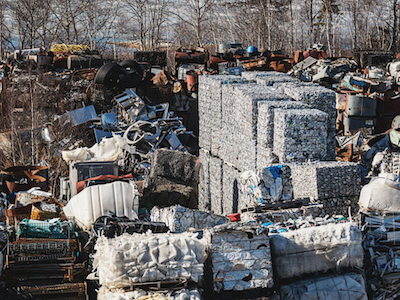Market

February 7, 2017
Surprise! Scrap Prices Firming as February Negotiations Continue
Written by John Packard
The ferrous scrap markets have been all about doom and gloom up until the past couple of days. Obsolete grade and shredded scrap were reported trading down $25 per ton in Brazil. Prime grades were down $10 per ton. Our sources were telling us export prices were down and the exporters off the east coast were offering down prices into other areas of the country.
Now we are hearing of export trades on 80/20 mix to Turkey up $6 per ton and there is a question as to whether the Turkish buyers will be back for more in the coming days.
We are also hearing that the exporters may have misread the market and the actions of a very few exporters may have influenced the original deals done in the market at the beginning of this month.
On Monday evening, we heard from one of our scrap sources who provided us with a “heads up” on the market. We were told, “…I think you may want to focus on the changing market direction which will come into focus in the next few days. The market has gone from down $40 to down $25-30 for obsolete grades and from down $15 to sideways for good quality bush and bundles. Turkish sales have stabilized and momentum is on the supplier’s side. There is consensus building in the US domestic market that March prices will be no worse than February. As of this writing many dealers are reducing tons offered for Feb and asking for more money than offers given last week.”
One of our east coast sources had plenty to say about the changing scrap markets:
“In my opinion and based on some conversations I have had, the big public and even some privately-owned exporters simply misread the market. They got too bearish, panicked and sold too cheap. Now, they are going to have to play catch up again to get ahead of a rising market. The sales over the last two weeks seemed so “panicked” – it was like they went to the mills’ agents and said at what price are you interested, then when they heard the price said ok. From what I hear, the Turkish buyers were shocked. The exporters then turned inward and sold a little scrap at “discounted” prices to the US domestic market in February to try and bring the price down. They were somewhat successful. There may be some truth to cash flow and/or space issues, but fundamentally I think they just misjudged it.
“In truth, the export market has been hard to read since mid-November. There has been a lot of political instability in Turkey for months, and the Lira has been volatile relative to the USD and generally weakened against it. It has made US scrap more expensive and hurt end markets for Turkish products. But the harsh winter in Turkey really curbed mills’ appetites there temporarily. They will be back to buy, it has just been a question of when. The alternatives of Chinese billet that were a factor in Turkey last year and in 2015 are not really factors today. The newest scrap sale from the US East Coast is at $248/MT cif, which is up $6 from the last sale late last week. If we see the Turks come in and buy a bunch of cargos now, it could push the domestic market a lot higher. I am not saying that’s going to happen, but if it were to happen….
“The opaqueness of the export market has even faked out some domestic mills. One large mill / scrap operator was very hesitant to buy scrap this month and tried to bottom-fish. They will have to now chase the market higher. DJJ, it seems, has been buying all the scrap they can get their hands on, and even at that there is not a lot of it available. Dealers sold much of their accumulated inventory over the last 60 days and have not replaced what they sold.
“The market at this point has already bounced and we are seeing mills come back to us needing more scrap. Shred is pretty tight, but prime scrap is very tight. There is no question March will be higher – I am thinking back to January levels and maybe even higher than that.”
One of the large national companies told us, “The market has in fact firmed considerably in the past couple of days. The ‘swing tons’ off the East Coast are getting placed into the export markets, effectively nullifying the anticipated supply overhang on cuts and frag. It has caught some domestic scrap consumers flat-footed as they enter the market, resulting in some price recovery. At this stage, prompt industrial grades are essentially sideways from January and secondary grades are being traded down $10-15/gt versus the $20-30/gt decline anticipated last week…a traditional ‘dead cat bounce.’”
Okay, for those of you who like to get the full skinny (full story) here is what we received from scrap guru Mike Marley of World Steel Dynamics:
“Let’s talk about export first. A New England exporter sold a cargo this week and the price is up about $5 or $7 per metric ton (tonne) to about 246 or 247 and includes some shredded, not sure how much. Weaker demand from Turkish steelmakers and a steep drop in the prices they are paying has been the core problem for U.S. exporters. The 80/20 HMS price had dropped to about $220 per tonne in deals with their European scrap suppliers. U.S. prices dipped to about $240 per tonne for the same grade. That’s better than what the Europeans were getting, but scrap shipments from the U.S. include higher loading and ocean freight costs.
“But the Turks only pay a $5 per tonne premium for shredded. Thus, for some exporters it was not worth selling them shredded. The delivered price would be $245 and the F.O.B. price in the boat would be no more than $210 when you deduct the stevedoring and ocean freight costs (roughly $35 per tonne). So, exporters and others on the East Coast were selling all of their shredded at home because they could get as much as $260 from mills in Pennsylvania and an F.O.B. price in a barge or railcar of about $240 going South. That’s down $35 or $40 per ton from January but significantly better than what they could net going to Turkey. One in the Philly area sold a 40,000 tonne cargo that had no shred in it. That’s very unusual.
“Prices were now so low that it awakened the Indians who had abandoned the U.S. East Coast market in November when U.S. prices started climbing. They had cut their offers for shredded in containers to as low as $220 per tonne F.A.S. a U.S. dock last month. Now, they suddenly have an appetite and have upped their offers to $245 per tonne and the East Coast exporters and shredders are talking about wanting higher prices from them and from domestic mills.
“Moving inland, a couple of things have occurred. First, though there were reports that many of the big EAF steelmakers had cancelled their unshipped orders at the end of January; that was not the case. They canceled the undelivered cuts and shredded orders but not the industrial grades like busheling and bundles, particularly at their mills in the South. There are several reasons for this according to brokers and dealers.
“First, January was the third month in a row that prices rose and many dealers assumed it might be the last. Many of them oversold. As they say, they sold “paper.” Scrap they didn’t have and only hoped to get. This included some obsolete grades as well.
“Dealers by nature are short sellers. They sell not only what they have on the ground, but what they expected to see coming through the gates this month. When, that scrap didn’t arrive or they had sold some of it on “quiet deals” to other mills, they were short material promised earlier.
“Mills and the brokers we’re cancelling those unshipped orders at month’s end and plan to offer $10 or $20 per ton less, the dealers said, “Fine, I don’t have it and probably won’t have much for another week or two. Mills and brokers backpedaled and said, “We not cancelling. You still owe me 10,000 tons or whatever.”
“At the same time, some from the South are bidding up the prices of busheling in regions like Cleveland and Detroit. They are paying the same prices last month and may be taking scrap away from the local mills in those regions that fail to match their offers.
“Second, though many were expecting a price correction this month, but the flat-rolled ill are still busy and now have added competition for the industrial scrap from some of the other steelmakers are seeing a rise in their orders. That includes their new rival in Arkansas. Big River does not have its own scrap yards like its two main EAF-based flat rivals and has been buying busheling in the region as far East as Alabama and as far north as Chicago. Industrial scrap like busheling and bundles are a fixed supply. You can’t generate more by raising the price. All you can do is steal it from your rival mills.
“Third, sheet mills have been enjoying price stability in the past few months because of the steady demand. Their margins are good. Do they want to disturb that by cutting the busheling prices and face demand for lower steel prices. Didn’t John Ferriola tell analysts that he thought industrial steel scrap prices would be unchanged to off by $10 per ton this month. If scrap prices, particularly industrial scrap prices, remain unchanged, will steel users be able to ask for a price cut? Hardly.”
The post Surprise! Scrap Prices Firming as February Negotiations Continue appeared first on Steel Market Update.






